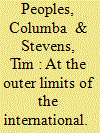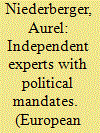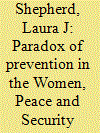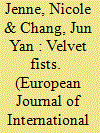|
|
|
Sort Order |
|
|
|
Items / Page
|
|
|
|
|
|
|
| Srl | Item |
| 1 |
ID:
175554


|
|
|
|
|
| Summary/Abstract |
As staples of science fiction, space technologies, much like outer space itself, have often been regarded as being ‘out there’ objects of international security analysis. However, as a growing subset of security scholarship indicates, terrestrial politics and practices are ever more dependent on space technologies and systems. Existing scholarship in ‘astropolitics’ and ‘critical astropolitics’ has tended to concentrate on how such technologies and systems underpin and impact the dynamics of military security, but this article makes the case for wider consideration of ‘orbital infrastructures’ as crucial to conceptions and governance of planetary security in the context of the ‘Anthropocene’. It does so by outlining and analysing in detail Earth Observation (EO) and Near-Earth Object (NEO) detection systems as exemplary cases of technological infrastructures for ‘looking in’ on and ‘looking out’ for forms of planetary insecurity. Drawing on and extending recent theorisations of technopolitics and of Large Technical Systems, we argue that EO and NEO technologies illustrate, in distinct ways, the extent to which orbital infrastructures should be considered not only part of the fabric of contemporary international security but as particularly significant within and even emblematic of the technopolitics of planetary (in)security.
|
|
|
|
|
|
|
|
|
|
|
|
|
|
|
|
| 2 |
ID:
175553


|
|
|
|
|
| Summary/Abstract |
Military attachés and wartime observers have received surprisingly little attention in international relations. Why do states exchange attachés, permitting uniformed foreigners to gather intelligence on their territory and during their wars? To explain, we adopt a broadly practice-theoretic approach, focusing on the individuals who developed the role by living it, showing how they both innovated a distinct military practice and established institutional legitimacy for attachés. We address an early historical case in which the practice proliferated: the Russo-Japanese War, throughout which observers represented multiple European states, on both sides of the conflict. Sometimes termed the first modern war, the conflict saw Japan's entry into the Eurocentric great power system. In this context, embedded attachés had a dual effect. On the one hand, a professional attaché community established itself: we show how local innovation by embedded officers, in the context of this structurally destabilising event, permitted the creation of a new institutional role that might otherwise have been impossible. On the other, the Japanese made use of the attachés as witnesses for Western governments, observing their performance of great power-hood, as they defeated Russia. The argument has implications for understanding both the military attaché system and communities of practice as such.
|
|
|
|
|
|
|
|
|
|
|
|
|
|
|
|
| 3 |
ID:
175557


|
|
|
|
|
| Summary/Abstract |
Some experts take on political mandates and simultaneously base their authority on a claim to independence: this balancing act enables international organisations (IOs) to incorporate ‘independent’ experts and generate ‘objective’ knowledge around their policies. However, how do these experts reconcile the contradictory roles of a mandated expert and an independent expert? I address this question by taking recourse to Goffman's sociology and two related concepts: sociological ambivalence refers to situations in which a person faces conflicting expectations. This conflict can be remedied through role distance, that is, behaviour that signals a degree of disaffection from the role one is currently performing while one simultaneously continues to perform that role. I conduct a case study of ‘independent’ experts hired by the UN Security Council to monitor sanctions, analysing how their position is sociologically ambivalent and how their knowledge practices are interlaced with performances of role distance. The findings have two implications for macro-phenomena: first, by keeping their contradictory role constellation functional, experts make it possible for IOs to mobilise ‘independent expertise’. Second, because experts perform role distance through the way they produce knowledge, role distance leaves traces in political knowledge.
|
|
|
|
|
|
|
|
|
|
|
|
|
|
|
|
| 4 |
ID:
175555


|
|
|
|
|
| Summary/Abstract |
Prevention is a central pillar of the ‘Women, Peace and Security’ agenda, a policy architecture governing gender and conflict that is anchored in a suite of United Nations Security Council resolutions adopted under the title of ‘Women and Peace and Security’. In this article, I argue that prevention is currently constituted within the WPS agenda in multiple ways, all of which are organised in accordance with different logics: a logic of peace; a logic of militarism; and a logic of security. This presents prevention as a paradox, because in operation it collapses back into a logic of security, even as it is constructed and positioned as security's temporal and conceptual other. I provide a close reading of the WPS resolutions and show how the articulations of prevention across the agenda, and in certain resolutions, operate according to logics of security and militarism. The significance of such an argument is twofold: it lies both in the possibility of reconstruction of prevention in the WPS agenda according to different logics, and in the potential of undoing security – as the manifestation of prevention in practice – in queer, feminist, decolonial, and posthuman ways of knowing and encountering the world.
|
|
|
|
|
|
|
|
|
|
|
|
|
|
|
|
| 5 |
ID:
175552


|
|
|
|
|
| Summary/Abstract |
Spheres of influence remain one of the most pervasive phenomena in the practice and history of international relations, yet only rarely have they been taken up analytically. To bring conceptual and discursive clarity, this article advances two arguments. First, it argues that spheres of influence are not a distinct form of hierarchy in international relations, but rather practices of control and exclusion that can be found within any ideal-type hierarchy. Second, these hierarchical practices are generally underspecified by those invoking the term. Different theoretical perspectives on international relations offer highly divergent ways of understanding control and exclusion, and all do so with plausible empirical mooring. Spheres of influence do not themselves denote a form of governance even if it does a form of order construction and maintenance. Any given empire, hegemonic order, or alliance may also be a sphere of influence depending on the practices that occur; the key is not to identify whether particular hierarchical traits are dispositive of one of these relational structures, but rather whether, and the extent to which, assertions of control and exclusion define the hierarchy.
|
|
|
|
|
|
|
|
|
|
|
|
|
|
|
|
| 6 |
ID:
175556


|
|
|
|
|
| Summary/Abstract |
Defence diplomacy represents a notable paradox. On the one hand, it is a cooperative activity to build strategic and moralistic trust between states and thus positively shape the environment in which foreign policy is made. On the other hand, defence diplomacy also involves competition and demonstrations of military power, which may contravene its goal of building moralistic trust and undermine confidence between states. This article deals with the latter competitive realpolitik elements of defence diplomacy in terms of secrecy, swaggering, and shows of force that have largely been ignored in the literature. Building on a theoretical discussion of whether defence diplomacy works, the case of peacekeeping in Southeast Asia is analysed to illustrate how defence diplomatic activities produce effects contrary to their stated aims.
|
|
|
|
|
|
|
|
|
|
|
|
|
|
|
|
|
|
|
|
|